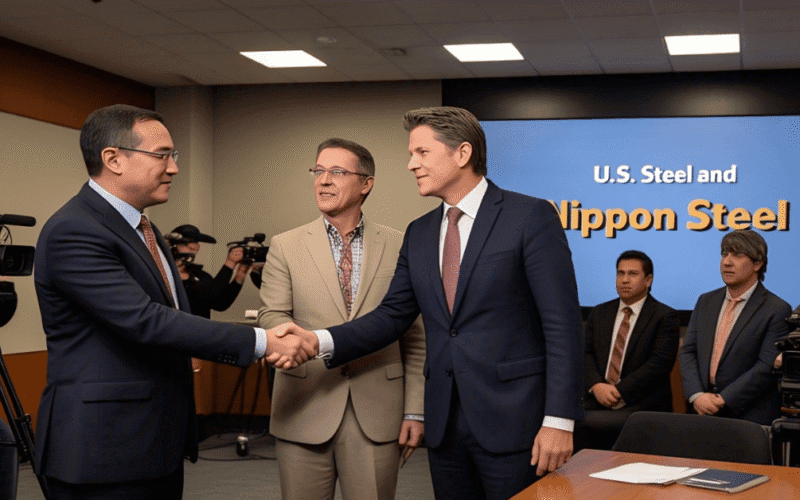President Trump announces a strategic partnership between U.S. Steel and Japan’s Nippon Steel, ensuring U.S. control, $14 billion investment, and 70,000 new jobs.(Reuters)
Table of Contents
- Introduction
- The Strategic Partnership: Key Details
- Economic Implications for the U.S.
- Political Reactions and Stakeholder Responses
- Historical Context of U.S. Steel
- Future Outlook and Industry Impact
- FAQs
Introduction
In a significant move affecting the American steel industry, President Donald Trump has announced a strategic partnership between U.S. Steel and Japan’s Nippon Steel. This collaboration, described as a “planned partnership,” aims to revitalize U.S. Steel through substantial foreign investment while maintaining American control over the company. The deal includes a $14 billion investment and the creation of 70,000 jobs, signaling a major shift in the domestic steel landscape.(Reuters)
The Strategic Partnership: Key Details
- Investment Amount: Nippon Steel plans to invest $14 billion into U.S. Steel’s operations.
- Job Creation: The partnership is expected to generate 70,000 jobs across the United States.
- Headquarters: U.S. Steel will retain its headquarters in Pittsburgh, Pennsylvania.
- Control: Despite the foreign investment, President Trump emphasized that control over U.S. Steel will remain with the United States.
- New Developments: Up to $4 billion of the investment is allocated for building a new steel mill, enhancing domestic production capabilities.( CBS News)
President Trump stated, “It will be controlled by the United States, otherwise I wouldn’t make the deal.” (@EconomicTimes)
Economic Implications for the U.S.
The partnership is poised to have several economic benefits:
- Boost to the Economy: An injection of $14 billion is anticipated to stimulate economic growth, particularly in the manufacturing sector.
- Job Creation: The creation of 70,000 jobs will reduce unemployment and strengthen the labor market.
- Technological Advancements: The investment will likely lead to modernization of facilities and adoption of advanced steel production technologies.
- Global Competitiveness: The collaboration positions U.S. Steel to become the world’s third-largest steel producer, enhancing its competitiveness on the global stage.( POLITICO)
U.S. Steel’s stock surged 21% following the announcement, reflecting investor confidence in the deal’s potential. (The Guardian)
Political Reactions and Stakeholder Responses
The partnership has elicited varied responses from political figures and stakeholders:(The Guardian)
- Support: Senator Dave McCormick and other political figures have praised the deal for its potential to revitalize the American steel industry and create jobs. (The Guardian)
- Concerns: The United Steelworkers union has expressed apprehension regarding foreign ownership and its implications for domestic workers.(The Times)
- Community Response: Residents and workers in Pennsylvania, a state with a rich steelmaking history, have shown cautious optimism, hoping the deal will bring economic revitalization to the region.
Historical Context of U.S. Steel
U.S. Steel, established in 1901, was once the largest steel producer globally and a symbol of American industrial prowess. Over the decades, the company faced challenges due to foreign competition and declining domestic demand, leading to a reduction in its global standing. The partnership with Nippon Steel represents a strategic effort to restore U.S. Steel’s prominence in the industry. (Wikipedia)
Future Outlook and Industry Impact
The strategic partnership is expected to:(AP News)
- Enhance Production Capacity: The investment will likely increase U.S. Steel’s production capabilities, meeting both domestic and international demand.
- Promote Technological Innovation: Collaboration with Nippon Steel may introduce advanced steelmaking technologies, improving efficiency and product quality.
- Influence Global Steel Markets: As the third-largest steel producer post-merger, U.S. Steel’s enhanced capacity could impact global steel prices and trade dynamics.
- Set Precedents for Foreign Investment: The deal may serve as a model for future foreign investments in critical U.S. industries, balancing economic benefits with national interests.
FAQs
Q1: Will U.S. Steel remain an American company?
Yes, despite the partnership with Nippon Steel, control over U.S. Steel will remain with the United States, and its headquarters will stay in Pittsburgh.(CBS News)
Q2: How will the partnership affect American workers?
The deal is projected to create 70,000 jobs, offering significant employment opportunities in the steel industry and related sectors.(Reuters)
Q3: What are the concerns regarding foreign investment?
Some stakeholders, including labor unions, are concerned about potential impacts on domestic workers and the implications of foreign ownership in a critical industry.
Q4: How will the investment be utilized?
The $14 billion investment will be directed towards modernizing existing facilities, building a new steel mill, and enhancing production capabilities.(Reuters)
